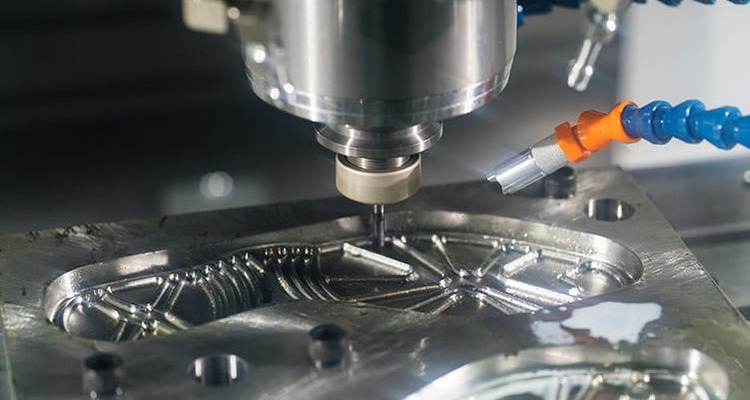Address
304 North Cardinal St.
Dorchester Center, MA 02124
Work Hours
Monday to Friday: 7AM - 7PM
Weekend: 10AM - 5PM

CNC machining is used in the medical sector for many applications, from small to large components. These applications include the following:
Electronic medical equipment
CNC machines have a great capacity to create advanced medical devices with high requirements. These machined medical components must meet meticulous safety and reliability standards to avoid equipment malfunction. Consequently, manufacturers use bulkier materials for machining surgical tools than for medical implants.
In general, surgical instruments have simple designs consisting of one or more metal parts. Sophisticated medical devices, on the other hand, comprise several hundred to thousands of separate parts. These devices include ultrasound equipment, heart rate monitors, X-ray machines, MRI scanners, CT scanners, and specific diagnostic equipment.
Surgical instruments
CNC machining is a popular process for manufacturing precise, high-quality surgical instruments for the medical industry. Common examples of surgical tools used by experts include forceps, blade handles, cutting pliers, surgical scissors, implant holders, biopsy tubes, and more.
These surgical instruments often require meticulousness and precision and are subject to additional safety requirements, including ease of sterilization. Manufacturers often need to produce surgical tools and instruments within a limited timeframe, and some have customized specifications, making CNC machining the ideal solution.
Medical implants
Medical machining has contributed enormously to the production of various body implants and to the testing of medical implants, improving patients’ quality of life. Common examples include hip and knee implants.
Healthcare professionals often order implants in small quantities. As a result, the injection molding process becomes too costly, while CNC machining is the ideal option. Manufacturers produce medical implants from metals such as titanium and plastic resins such as PEEK.
Materials commonly used in the machining of medical instruments
Every medical component must be designed and created with disposal or sterilization in mind, as well as malleability, tension and tolerance requirements. Consequently, it’s essential to use the ideal CNC machining materials that ensure your product meets functional and quality criteria. Here are some of these materials:
Stainless steel
Stainless steel is one of the most popular metals for medical manufacturing. It is a highly durable and robust material with exceptional resistance to corrosion. Its biocompatibility makes it suitable for a variety of applications. It is easy to polish for a refined, easy-to-clean surface. Stainless steel applications include clamps, forceps and hemostats, and are ideal for hip joint replacements.
Aluminum
Aluminum is a lightweight material with good corrosion-resistance properties. It responds well to anodizing to improve its corrosion resistance and aesthetics. However, it is not an ideal material for the manufacture of devices that come into direct contact with the human body. However, it is your preferred choice for support equipment such as IV brackets, orthopedic supports, wheelchairs, etc.
Magnesium
Magnesium is a biocompatible metal with an excellent strength-to-weight ratio. It is a perfect material commonly used in bone graft replacement and cardiac stents due to its tendency to biodegrade safely.
Titanium
Titanium is a perfect substitute in situations where stainless steel is not compatible. It offers high strength, biocompatibility and durability. It is ideal for the creation of skeletal supports, bone replacements and prostheses.
Copper
Its excellent antiviral and antibacterial properties make it viable for the machining of medical components. It is perfect for manufacturing components that are constantly being touched, such as switches and screen buttons. In addition, some manufacturers make dental implants from copper.
PEEK
PEEK is a thermoplastic renowned for its incredible strength and excellent high-performance qualities. Its high chemical resistance makes it perfect for medical parts frequently exposed to aggressive chemicals. Applications include temporary contact products such as prostheses, ventilation tubes, X-ray machines, and surgical clamps.
Acrylic
Optical clarity and high impact resistance. Typical applications include protective screens, dentures, contact lenses, microscopes and lasers, and orthopedic implants.
Delrin
This thermoplastic material has good chemical resistance properties and a low coefficient of friction. In addition, Delrin has high strength and is very rigid and dimensionally stable, making it an excellent material for machining medical parts requiring precision and durability. Everyday use includes forceps, inhalers, orthopedic implants, scalpels and other simple medical components.
PTFE (Teflon)
Teflon is a medical-grade plastic with excellent heat resistance and dimensional stability. It is a good choice for the manufacture of components that require frequent steam sterilization, and devices that demand high precision and reliability. Typical PTFE applications include prostheses, catheters, dressings, implantable devices, etc.
Nylon
Nylon is a versatile, engineering-grade thermoplastic with many applications in the medical industry due to its remarkable strength and toughness. It’s an excellent choice for clamps, dental devices, implants, sutures and forceps.
Polycarbonate (PC)
This is a CNC-machined plastic renowned for its high impact resistance, optical clarity and strength. Typical applications in the medical sector include the manufacture of equipment housings, tubes and connectors for medical devices, breathing masks, protective goggles and shields, and surgical instrument handles.